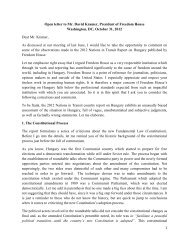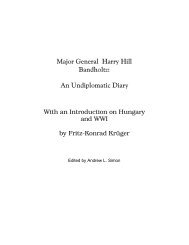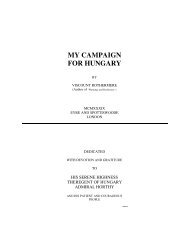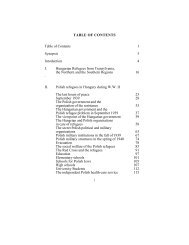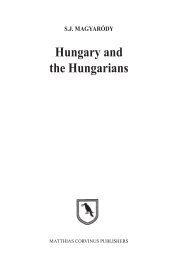The Fate of Western Hungary 1918-1921 - Corvinus Library ...
The Fate of Western Hungary 1918-1921 - Corvinus Library ...
The Fate of Western Hungary 1918-1921 - Corvinus Library ...
You also want an ePaper? Increase the reach of your titles
YUMPU automatically turns print PDFs into web optimized ePapers that Google loves.
prerogatives, although they must have known that it would clearly lead to civil<br />
war, foreign occupation and the destruction <strong>of</strong> the country. (…) Thanks to the<br />
loyalty <strong>of</strong> the national forces and the sobriety <strong>of</strong> the Hungarian people, this<br />
attempt, that would have sealed the fate <strong>of</strong> the country forever, failed.” 479 <strong>The</strong><br />
proclamation was also signed by Prime Minister Bethlen.<br />
After the second unsuccessful ‘visit’ by the former king, a peculiar exchange<br />
<strong>of</strong> telegrams took place between Governor Horthy and commander Prónay.<br />
“<strong>The</strong> army <strong>of</strong> the Lajta-Banate delightedly greets Your Excellency that, through<br />
personal valor and exemplary perseverance, You were able to deflect the longtime<br />
danger threatening the Country. / (Signed) Prónay.” Horthy did not<br />
personally respond to the commander’s telegram but replied through his aidede-camp,<br />
Maj.Gen. László Magasházy (1879-1959). “His Excellency, the<br />
Governor, ordered that I express the warmest heartfelt thanks to You and your<br />
subordinates for the salutations sent to him. / Maj.Gen. Magasházy.” 480<br />
<strong>The</strong> Foreign Minister, Miklós Bánffy, remarked thusly in his memoirs <strong>of</strong> the<br />
second royal return attempt, “the mad adventure <strong>of</strong> king Charles,”: “He utterly<br />
ruined our relationships with the successor states, foreign policy-wise, and cut<br />
<strong>of</strong>f any path to reconciliation. It was as a result <strong>of</strong> the royal coup d’état that the<br />
Little Entente was created. <strong>The</strong>y were on relatively good footing with each<br />
other but no agreements bound them together and everybody had freedom <strong>of</strong><br />
action, as the Marienbad discussions proved. Now, instead <strong>of</strong> a Hungarian-<br />
Austrian-Czechoslovak bloc, the Little Entente came to be, aimed exclusively<br />
against us, under the leadership <strong>of</strong> Beneš. (…) Our immediate loss, however,<br />
showed in Burgenland. <strong>The</strong> Venice Protocol, as I have said, orders that, until<br />
the plebiscite and the finalizing <strong>of</strong> the borders, our gendarmes provide public<br />
safety services, under [the direction <strong>of</strong>] Gen. Ferrario. [Col.] Lehár, however,<br />
withdrew them and under false pretexts led them against Budapest [i.e., Horthy<br />
and the Hungarian government-J.B.]. Here, they scattered. As a result, their<br />
place has been taken by foreigners, mainly Italian carabinieri, 481 which raised<br />
the assumption <strong>of</strong> the population that we have given them up. Although the<br />
plebiscite held in Sopron and surrounding area turned out well, but the border<br />
adjustment, which we accomplished in Venice based on the [Millerand]<br />
accompanying letter, which would have significantly corrected the insane<br />
border in our favor, was absent and only much later, when the Austrians took<br />
possession <strong>of</strong> it, did it gain a final resolution in 1922, to our and the<br />
population’s detriment.” 482<br />
In the meantime, the Hungarian Parliament stripped not only Charles IV but<br />
the House <strong>of</strong> Habsburg <strong>of</strong> their right to claim the Hungarian throne by passing<br />
479 In: IV. Károly visszatérési kísérletei. I. füzet. <strong>1921</strong>, p. 213.<br />
480 Lajtabánság, <strong>1921</strong>, November 3, p. 4.<br />
481 Carabinieri: Italian military police arm. In this case, Italian units ordered by Gen.<br />
Franco Ferrario as president <strong>of</strong> the Inter-Allied Military Mission in Sopron.<br />
482 Bánffy, 1993, op. cit., pp. 108–109. (Bolding mine–J.B.)<br />
187




